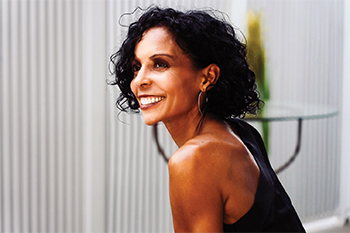Colon Cancer Survivor
Former Rockette focuses on helping others facing colon cancer

Receiving a Stage III colon cancer diagnosis at 50 took Jennifer Jones completely by surprise. Aside from minor symptoms, the former Radio City Rockette felt fit and healthy. She is grateful for the support of a skilled medical team and her family, and today, after successful treatment, Jennifer is cancer-free. As she channels her creativity into many personal and professional projects, she also gives back to the colon cancer community.
Colon cancer is an important topic, and one I can’t quit talking about. That’s why I volunteer as a buddy for the Colorectal Cancer Alliance. I talk with people who are newly diagnosed or undergoing treatment for colon cancer. Most of their questions revolve around side effects and ideas for managing them. Sharing the practical tips that helped me during treatment is one way I can give back.
I’ll admit, I wasn’t always so open about my diagnosis. As a vegetarian for 30 years and a former dancer, I felt very in tune with my body. I attributed the pressure and gassiness I felt to a gluten allergy or maybe IBS. I had just turned 50 and was planning to have my first colonoscopy anyway, so I described my symptoms when I made the appointment. The doctor performed a colonoscopy and an endoscopy then came in while I was drinking my post-procedure juice to tell me I had cancer and five years to live. Just like that. I was shocked, and the lack of control I felt over my own body was unsettling. Ashamed of the diagnosis, I kept it to myself.
Finally, I told my family, who immediately encouraged me to move my care to a well-known cancer center in New York City. There, I began working with an oncologist and surgeon who focused on me: making sure I understood my Stage III diagnosis, discussing treatments, answering my questions about everything from what happens during treatment to nutrition. They also listened to my wishes. I was adamant about not having an ileostomy, and because of where the tumor was located in my sigmoid colon, my surgeon thought it was possible we could avoid it.
My treatment plan included chemotherapy by infusion and then orally to shrink the tumor, followed by surgery.
After my first infusion, I began to worry about the side effects of chemotherapy. They didn’t start immediately. I had a few days where I actually had an appetite, and I realized how I’d been using nutrition to manage my symptoms up to that point. It felt amazing to eat eggplant parmigiana.
Eventually, I had stiffness in my infusion arm, discolored hands and feet, and an extreme sensitivity to cold. Keeping gloves by the refrigerator helped with that. My pinkie toenails fell off, my hair thinned but didn’t fall out completely, and my skin became sensitive to wind and breezes, even in warmer weather.
At times, my throat felt like it was closing. I found that meditation and visualization relaxed me. Picturing my throat loosening was powerful, and those strategies helped me in other areas. I re-evaluated what mattered in my life. I told myself positive affirmations and visualized my colon working perfectly. I journaled and worked hard at de-stressing. I also remained focused on nutrition.
Halfway through my eight rounds of chemotherapy, my doctors checked to see if the treatment was working. “What are you doing?” they asked me. The tumor had shrunk so much it was hard to identify, and I felt great. I was so excited and thought I’d be able to stop the chemo and skip the surgery. The cancer center’s tumor board, however, didn’t agree. They recommended I finish the treatment plan. As sad as that made me, I felt comforted knowing a group of specialists had discussed what was best for me, and I followed their recommendations.
Right before surgery to remove the tumor and check the surrounding lymph nodes, I reminded the entire team that I did not want an ileostomy. The next thing I remember, the team was encouraging me to wake up. I reached toward my stomach and tapped it, and one of my doctors immediately said, “No bag!” Shortly after, I was told the surgery was successful and that I was cancer-free. My follow-up plan would be blood work, scans and colonoscopies for the next five years.
My recovery was harder than expected. I am very active, yet I had quite a difficult time even circling the hospital hallways. I wondered if I’d ever feel energetic again. It really changed my perspective and enabled me to have compassion for other people going through something similar.
I am blessed and so thankful, and it’s important to me to contribute to the world. We only get one life, and I came too close to losing everything. Today, I feel great and have a lot to look forward to. I’m engaged and waiting to get married. I’ve just been cast in an independent film, written a children’s book that is being illustrated, and am working on other books about my cancer journey and my life as a professional dancer.
Along with focusing on my family and career and being a buddy, I promote early detection. With no family history of colon cancer, I am lucky that I had a colonoscopy when I did and am pleased the recommended screening age has been lowered to 45. I think there are a lot of misconceptions about colonoscopies. People worry about the prep and the procedure. It’s nothing to be scared of, and it is lifesaving!
As you go forward, remain calm. Find a medical team you trust and surround yourself with support.


